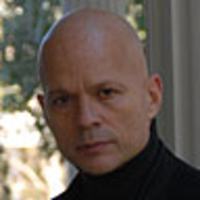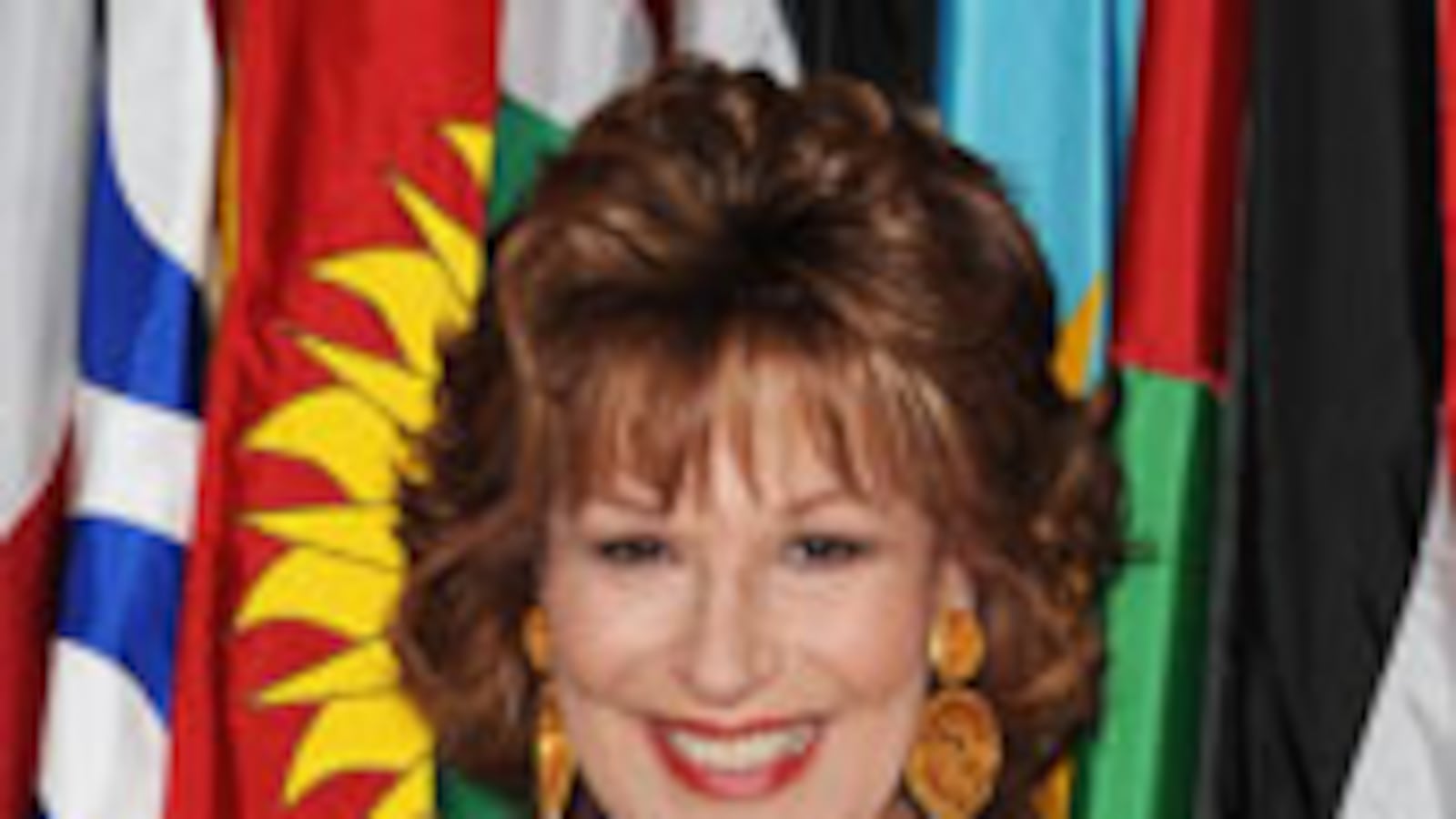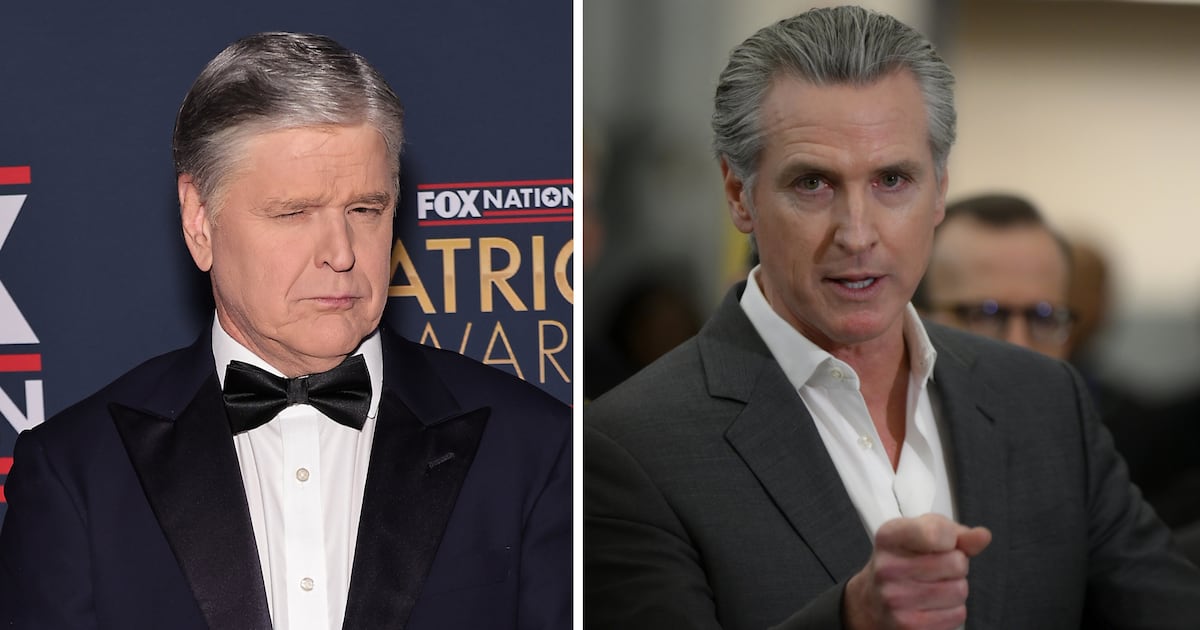
Stand-up comedienne Joy Behar found her greatest success when she finally decided to sit down.
As one of the original co-hosts of The View, and now on The Joy Behar Show on HLN, she has become one of the leading liberal voices in media. Her show has caught on quickly, beating even Larry King in the ratings 21 times in the first quarter of this year. Not shy about going for the laugh line, she is also deadly serious when the discourse calls for it. In all her camera-ready conversations, it is her dexterous intelligence that keeps it all carefully balanced. And let’s face it: The lady loves to dish.
Born Josephina Victoria Occhiuto, she was the only child of working-class parents in the Williamsburg section of Brooklyn. Her mother was a seamstress and her father drove a delivery truck for Coca-Cola. Her first tickets out of the neighborhood were marriage and a college education. She received a master's in English education and was a high-school teacher for many years. Married in 1965, she was divorced in 1981 and has one daughter, Eve, who is a celebrated ceramicist. She has been happily unmarried to her partner Steve Janowitz since the mid-1980s.
“I don’t want to be the kind of person who is closed to the right wing. I do like having conversations with those on the right.”
I met Behar at her office in the Time/Warner Building in New York after a long day of taping both The View over at ABC and her own show at the CNN studios. Though a bit tired, she was still ready to keep the conversation going, for she is mindful of how wonderful it is that the media culture still has room for a woman who, like her point of view, is well matured.
You’re having quite a second act in your life.
I don’t think I ever had a first one. Well, my first one was as a regular person in the world. I was married and had a kid. Went to college. Worked in a mental hospital. Taught at-risk kids. Worked as a receptionist at Good Morning America. Had a near-death experience from an ectopic pregnancy. Got a divorce. Got fired. Then, became a comedian.
I don’t know. That’s sounds like a first act worthy of Odets at his wordiest.
Well, that near-death experience was bad. And the divorce was horrendous. And the firing wasn’t so great either. All those high-stress things all happened around the same time. They all sort of propelled me into this second act. But going into show-biz was hard too. Sometimes I look back and if I knew what I was going to have to put up with, I don’t know if I would have done it.
Well, you chose a very tough part of the business to break into—that comedy club circuit. It’s a killer, and not that kind to women.
Last night I went to see this documentary about Joan Rivers. It’s called Joan Rivers: A Piece Of Work. It’s stupendous. I loved it. The way she describes her career and the way they described it in the film—well, it’s just appalling. The things we’ve had to put up with.
Yet a lot of her early work was itself self-deprecating.
But she gets a bad rap for that. And so does Phyllis Diller. No. 1: Nobody would accept a woman standing up there being funny very easily. It was difficult to accept back then. The big stars of the day were Martha Raye. Lucille Ball. These were women who basically took the punch. So you had to do it as a comic also. Joan’s daughter in the documentary says at one point, “All stand-up comedians are insecure people.” And I’ve been thinking about that. I’ve been wondering if I’m an insecure person. But I don’t think I am an insecure person. First of all, I’ve had a lot of psychotherapy.
You have such chutzpa about everything in your life but you do have an issue about saying your age. You’re so open about so much in your life but you won’t come out of the closet about that.
I know. But it’s been told everywhere now.
On CBS Sunday Morning, they said 63 when they recently did a story on you. But I read somewhere else that you’re 67. If you really are 67, you look damn good. I would own it, honey.
Let’s not say that number aloud anymore. OK? You know what it is. At a certain point the number starts to get so high it gives me vertigo. So I can’t say it!
Come on, Joy. With all your therapy, can't you accept that to many women you're daily proof that 60 is the new 40.
Tonight on my show I had William Shatner on. He’s in his eighties and he’s got three or four projects on the burner. Last night I had Phil Donahue on and we got a really great rating. They are always saying in television, “the young, the young, the young.” Well, not necessarily.
When and if Larry King ever retires would you like to take over his chair on CNN?
I don’t know. We’re doing really well over here at HLN. If it would be a good move for my show to move over there, then I would certainly want to do it. I mean I do think the CNN audience is my audience. So why not. Larry has been very good to me. And he was very charming and gracious when I took this slot at HLN opposite him.
But hasn’t Larry sort of anointed Ryan Seacrest as his successor? You’ll have to elbow Ryan out of the way.
Well, I don’t know. Do you think Ryan Seacrest would be good in that slot?
Let me put it in a question. How do you explain Ryan Seacrest’s career?
Well ... he’s ... ah ... he’s cute. He’s cute in a way.
Don't be sexist.
No. No. He's very likable. Cute meaning ... I don't know what word I should use... charming. He was in the right place at the right time.
I see Donald Trump’s name on your lineup board. You had him on tonight. He and his wife Melania were on The View the other day as well. Now stay with me. The other night on your show you had Richard Lewis on and he said that he “felt badly” about something. You almost jumped down his throat correcting his English. Trump used the same phrase on The View the other day, saying he “felt badly” for Tiger Woods and you sat there beside him and didn’t utter a peep.
Oh, I thought about it. Believe me.
I could feel you chomping at the bit.
The shows are different—is that what your getting at? First of all, Richard Lewis is an old friend of mine. And he’s a comic. He and I love to spar. I said to him, “You don’t say, ‘I feel sadly.’ So why would you feel badly?” With Richard it was different. As a rule I’m not going to be rude and go around correcting people’s English—even, as tempting as it was, Donald Trump’s.
But are you also thinking, OK this is Barbara Walter's show and I have to behave.
Over the years—I’ve been there for 13 years now—I don’t think I’ve behaved that well. I became notorious for confronting John McCain.
But Frank Rich in his Sunday New York Times column called you the modern-day Edward R. Murrow for calling John McCain out on his lies during the presidential campaign when more mainstream journalists wouldn’t.
I know. That was a good one. I got rewarded for my big mouth. I’ll never forgive John McCain for foisting Sarah Palin on us. I took on Rod Blagojevich. I have taken on politicians from time to time. I feel that politicians are fair game whereas regular people in the business really aren’t. I’m not out to get them or to criticize them in public to make them look bad. Politicians are different. They work for me. Other people don’t work for me.
You are the only original co-host left on The View.
Yep. Barbara and I.
After all this time do you still look on her as a mentor or do you see her now as a colleague?
She is kind of like a colleague now—as much as a living legend can be your colleague. She always laughs when I call her that.
What have you learned from Barbara other than the importance of good lighting?
Well, she has a tremendous work ethic. She—and Joan Rivers—will never retire. Because I’m at the advanced age that we dare not mention aloud anymore, I did not start young at all this. I really haven’t been in the business as long as someone like Barbara. So I’m not sure I would want to quit so easily myself, but I am hoping I will know when to exit stage left.
That moderator’s chair on The View has passed from Meredith Vieira to Rosie O’Donnell to Whoopi Goldberg. Did you ever feel passed over for not being offered that job yourself?
No. I didn’t feel passed over because it becomes a very tricky thing to be as part of that show. They never asked me to do it. And I’ve never asked to do it. It’s a Catch-22, that seat. Different things happen in that seat. You have to control things too much. Look, I’m basically an only child. So I’m back being one here on my show. I’ve put in my time as a sibling over there for 13 years.
You’re a left-winger who seems to get along with right-wingers. You like to book Ann Coulter, for example.
So you hate her, huh.
Well, I question someone’s judgment whose criticism of John Edwards was once based on her calling him a “fag.” That was certainly insightful. I do find her shtick hateful. I think you like her because she looks like your partner Steve—they each have a kind of gangly appeal. Though she’s probably got a better goose step.
A lot of my friends on the left hate her. I can’t say that I love her. I don’t hang out with her. But I like to have her on and spar with her and tease her and play around with it. I like to have her on the way Bill Maher likes to have her on his show, but she told me she doesn’t want to go on there anymore because she doesn’t like the audience and the way they behave. She feels that they’re always clapping and yelling and participating too much.
Like A Tea Party crowd, huh.
Well, yeah. Look, I don’t want to be the kind of person who is closed to the right-wing. I do like having conversations with those on the right.
On The View you’ve got Elizabeth Hasselbeck to contend with every day. But some days I sense you just rolling your eyes at what she says and don’t want to waste your energy anymore with her.
I’m not arguing with her anymore. I don’t want to. You’re right. It’s exhausting. And I don’t feel like doing it any longer. I just don’t.
Bill Geddie—your boss who’s the Executive Producer of The View and who has worked with Barbara for ages—is a right-winger.
That’s right. And we’ve had some rocky days. But we don’t have a problem anymore because we understand each other. I said to him just recently, “Bill, let’s not ever talk politics again because we’ve been getting along so well.”
Well, you do have Barbara as an example. She’s worked with Bill forever and one of her closest friends—or a confidant at least—was Roy Cohn.
She doesn’t judge people by their politics I don’t think. That’s because she was trained as a neutral journalist—though, believe me, she has her own positions on things.
You were trained as a comedian. You still identify as that. You still go out and do stand-up. How has that affected this other even bigger aspect of your career now as a talk show host whose job at times does border on being a journalist?
The thing about comedians, rather than the fact that we’re insecure, is that more likely we just didn’t fit in in some way when we were growing up. So it does give you a sense of empathy when interviewing someone. But I do see myself as a comedian first and foremost. I wasn’t influenced by Edward R. Murrow growing up. I was influenced by Jerry Lewis. When I was a kid I used to go around the house acting like him and imitating him and getting laughs like Jerry Lewis. Then when I grew up, I would get laughs as a teacher. I would even get laughs when I worked in the mental hospital. And I’m still getting ‘em.
Editor’s Note: This interview took place last week, before Barbara Walters announced she would undergo heart surgery.
Kevin Sessums is the author of the New York Times bestseller Mississippi Sissy, a memoir of his childhood. He was executive editor of Andy Warhol's Interview magazine and a contributing editor of Vanity Fair and Allure. He is a contributing editor of Parade. His new memoir, I Left It on Mountain will be published by St. Martins Press.






